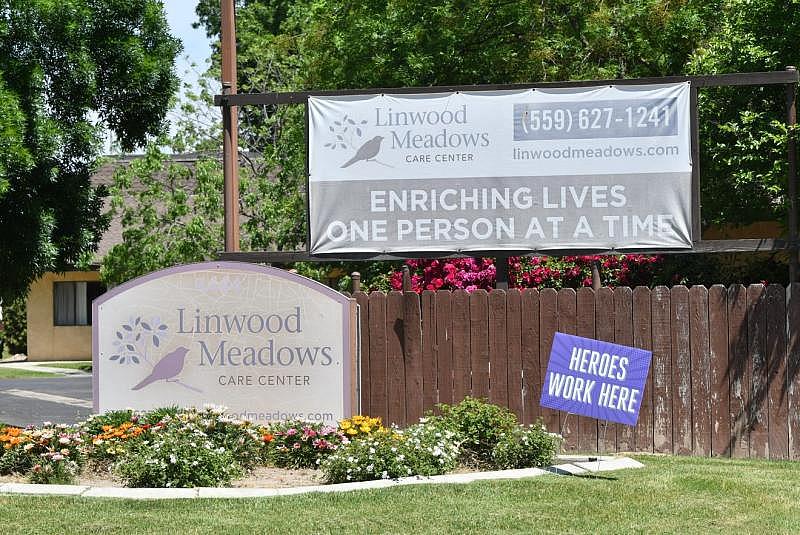COVID-19 breaks out in another Visalia nursing home owned by same company as Redwood Springs
This story was produced by Joshua Yeager for the USC Annenberg Center for Health Journalism’s 2020 California Fellowship.
His other stories include:
Redwood Springs: More residents have COVID-19 than any other California nursing home
Family worries father won't get life-saving therapy as Lindsay Gardens outbreak worsens: 31 cases
Coronavirus death toll reaches 40 in Tulare County: 640 cases, 105 recoveries
2 more nursing home outbreaks hit Tulare County amid largest weekly COVID-19 jump
People over profits': Visalia nursing home employees demand better working conditions

Vietnam veteran Jerry Hogan was recently admitted to Lindsay Gardens Nursing and Rehabilitation Facility, which now suffers a COVID-19 outbreak.
Jeremy Hogan, Polaris
A COVID-19 outbreak has hit another Visalia nursing home owned by the company that runs Redwood Springs, home to California's worst coronavirus rest home outbreak.
Health officials announced on Monday Visalia’s Linwood Meadows Care Center has 10 COVID-19 patients. The facility is run by Plum Healthcare, which operates dozens of other long-term health care facilities across the west.
It's not immediately clear if the Redwood Springs and Linwood Meadows shared staff, though no Linwood employees have tested positive at this time, administrators said.
Linwood Meadows Care Center in Visalia announced 10 of its patients tested positive for COVID-19. Joshua Yeager
The Linwood Meadows outbreak was discovered when a patient registered a high fever while in transit to Kaweah Delta Medical Center for an unrelated matter on April 25 and tested positive COVID-19 the following morning.
The remaining nine patients were tested at Linwood Meadows. None are showing symptoms and all are in isolation, officials said.
“We are thankful for the dedication and service of our valuable staff to fight this pandemic,” said Scott Ng, Administrator of Linwood Meadows Care Center. “They are true heroes in the battle against this cunning virus and continue to demonstrate their commitment to the well-being of everyone in our facility.”
But patient advocates and family members raised concerns about whether administrators and staff at Linwood took necessary precautions to prevent the coronavirus from entering the vulnerable facility.
Toni Mcdermott-Hopper, a retired nurse whose mother was admitted to Linwood in February and is still there, said she was uncomfortable with the care her mother is receiving and the hygiene practices of the facility.
Toni and her sister, Terri, visited their 88-year-old mother on her birthday Saturday.
The daughters had planned to remove their mother from the facility this week before they found out she had COVID-19 on Sunday.
"I don't expect her to survive but I hope she does so we can take her home and she doesn't have to die alone," Toni said.
She said she empathized with the nine other families who are likely experiencing a similar dilemma and called on nursing homes to "step up" to protect the elderly and provide them better care during the coronavirus crisis.
Approximately 16 people were tested at Linwood, according to a voice message the facility sent to residents' family members. The positive patients are being isolated in a separate ward.
“As public health professionals, we are concerned about these outbreaks, and we are working with the California Department of Public Health (CDPH) Licensing and Certification Program to implement all necessary safeguards at the facility,” Tulare County Public Health Director Karen Elliott said.
About 1.3 million people live in the nation’s 15,600 nursing homes, according to the CDC. And most nursing homes have had problems managing infections even when there is not a pandemic.
Seventy-five percent of U.S. nursing homes have been cited for failing to properly monitor and control infections in the past three years, according to a USA TODAY analysis of federal inspection data published earlier this year. Those citations have been as mild as a paperwork problem and as serious as failing to inform state officials that unmonitored workers had spread the disease to patients in an outbreak.
The first U.S. outbreak of COVID-19 happened in a Washington state nursing home where dozens have died, and the virus has continued to ravage similar facilities since. Such facilities are now considered "an accelerator" of COVID-19, the Centers for Medicare and Medicaid Services said earlier this month.
A Maryland nursing home reported a single case of COVID-19 in late March — and 64 cases the next day. In Pennsylvania, administrators at a nursing home outside of Pittsburgh said they would shift away from testing residents and presume all were positive. In Massachusetts, the Department of Justice has opened an investigation at a nursing home for veterans where 32 have died.
The incomplete picture of what is currently known about COVID-19 in nursing homes comes from a patchwork of data collected at the local and state level. A spokeswoman for the Centers for Medicare and Medicaid Services said nursing homes are required to follow their local and state reporting requirements, but she did not respond to questions about why the agency is not tracking the number nationally.
CDC spokesman Scott Pauley said the agency used “informal outreach” to state health departments late last month to estimate that 400 nursing homes had positive cases. The number has not been updated.
USA TODAY contributed to this report.
Joshua Yeager covers water, agriculture, parks and housing for the Visalia Times-Delta and Tulare Advance-Register newspapers. Follow him onTwitter @VTD_Joshy. Get alerts and keep up on all things Tulare County for as little as $1 a month. Subscribe today.
[This story was originally published by Visalia Times Delta].
Did you like this story? Your support means a lot! Your tax-deductible donation will advance our mission of supporting journalism as a catalyst for change.

